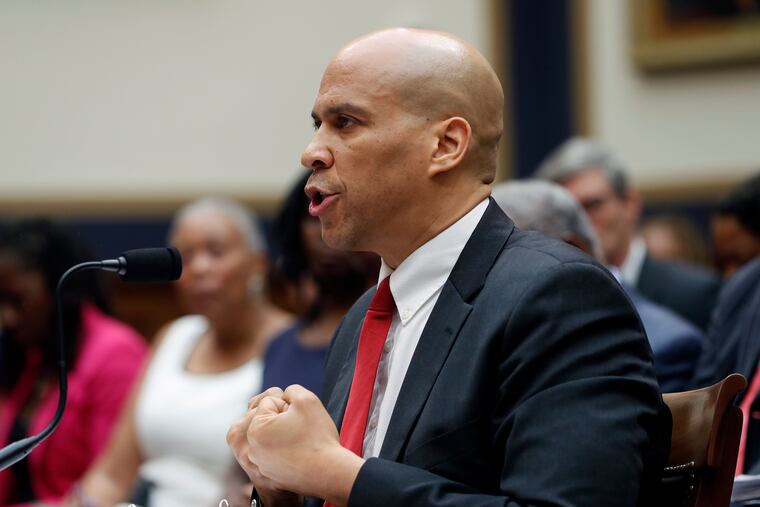Biden draws fire from fellow Dems over cordial words for segregationist senators, then hits back
Cory Booker, who cites the civil rights movement as one of the central influences on his life, demanded an apology after Joe Biden told donors about how in the 1970′s he managed to work together with two former senators who supported segregation.

WASHINGTON — Sen. Cory Booker of New Jersey and other Democrats took sharp aim at Joe Biden on Wednesday after the former vice president cited his past cooperation with segregationist senators as an emblem of a more civilized time in politics.
Booker demanded an apology to the public after Biden told donors Tuesday night how in the 1970s he managed to work well with Sens. James O. Eastland of Mississippi and Herman Talmadge of Georgia, Democrats who opposed desegregation.
“Vice President Biden’s relationships with proud segregationists are not the model for how we make America a safer and more inclusive place for black people and for everyone,” Booker said in a statement that is one of the most forceful responses from Democratic presidential candidates criticizing Biden, the campaign’s early front-runner.
Booker followed up by tweeting a photo of black protesters during 1968′s Memphis sanitation workers strike holding signs reading, “I am a man.”
He also accused Biden of downplaying the seriousness of Eastland’s use of the word boy, a phrase that he said was used to “strip black Americans of our very humanity.”
Biden refused to apologize.
“Apologize for what? Cory should apologize; he knows better,” Biden said late Wednesday. “I’ve not a racist bone in my body. I’ve been involved in civil rights my whole career. Period, period, period.”
He pointed to his support for the Voting Rights Act and said he “could not have disagreed with Jim Eastland more” on segregation.
“The point I’m making is, you don’t have to agree. You don’t have to like the people in terms of their views, but you just simply make the case, and you beat them. You beat them without changing the system,” Biden said.
Biden has consistently pushed back against calls from some liberals to change Senate rules to make it easier to advance legislation over conservative blockades.
The criticism from Booker was an unusual move for a senator who has campaigned on a message of unity and rarely attacks fellow Democrats.
It also shined a spotlight on a potential stumbling block for Biden: the perception among some Democrats that he is out of step with a party increasingly attuned to fighting racial inequality, and whose activists argue that his overtures to cooperation are outdated and ineffective after Republicans blocked former President Barack Obama at every opportunity.
Still, several black lawmakers came to Biden’s defense Wednesday.
Rep. Jim Clyburn (D., S.C.) said Biden’s comments were no different from his own work with Sen. Strom Thurmond (R., S.C.), a notorious segregationist, or attempts to deal with President Donald Trump.
“Working with Strom Thurmond is similar to Biden working with Talmadge,” said Clyburn, who is seen as a key voice in the Democratic primary in South Carolina, one of the early voting states in the contests. “Am I going to say that I’m not going to work with [Trump] trying to get 100 percent coverage of broadband into the rural communities of my district because of his expressions of racism? He is the president of the United States. His name has to go onto any bill that we pass.”
Rep. Dwight Evans (D., Pa.) said he had not heard Biden’s comments, but understood the sentiment and supported the idea of cooperation.
“He’s just trying to say he’s been around and he knows you have to get something done,” said Evans, a Philadelphian who supports Biden in the Democratic primary.
Booker, who lags in most polls, has made the fight against racial inequality a central piece of his campaign, and earlier Wednesday testified on a bill to provide African Americans with reparations for slavery.
But Biden has led the Democratic primary among black voters, polls show, including 52 percent support in South Carolina, according to one recent survey. South Carolina, where Democratic primaries are dominated by African American voters, is central to Booker’s campaign strategy.
Biden allies say he has a long track record of supporting issues important to the African American community, and note his eight years as vice president under Obama.
The controversy began at a fund-raiser Tuesday night in New York, where Biden responded to earlier criticisms of his claim that he could find common ground with the GOP by pointing to his work with Eastland and Talmadge, both now deceased, as is Thurmond.
“You have to be able to reach consensus under our system,” Biden said, according to a pool report from the event. He recalled his time with Eastland, briefly adopting a Southern drawl as he said, “He never called me ‘boy,’ he always called me ‘son.’ ”
He said Talmadge was “one of the meanest guys I ever knew,” but “we got things done. We got it finished.”
California Sen. Kamala Harris, another contender for the Democratic nomination, said she respects Biden. “But to coddle the reputations of segregationists — of people who, if they had their way, I would literally not be standing here as a member of the U.S. Senate — is, I think, it’s misinformed, and it’s wrong,” she said.